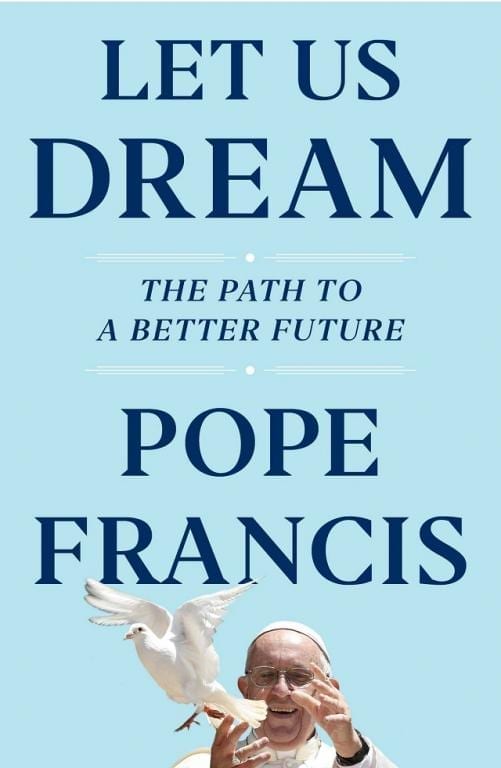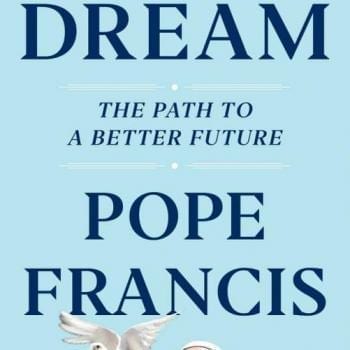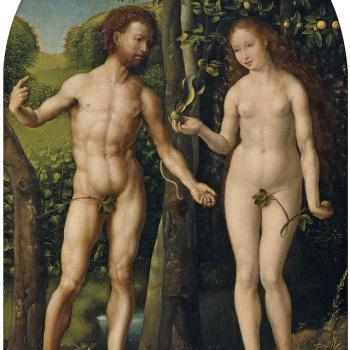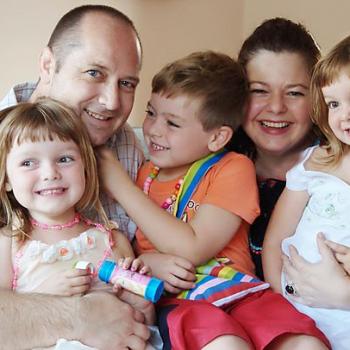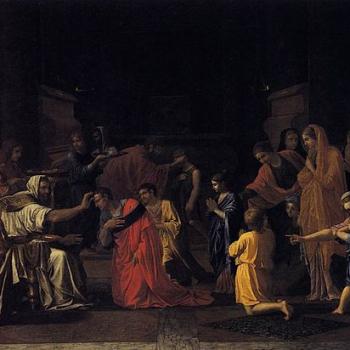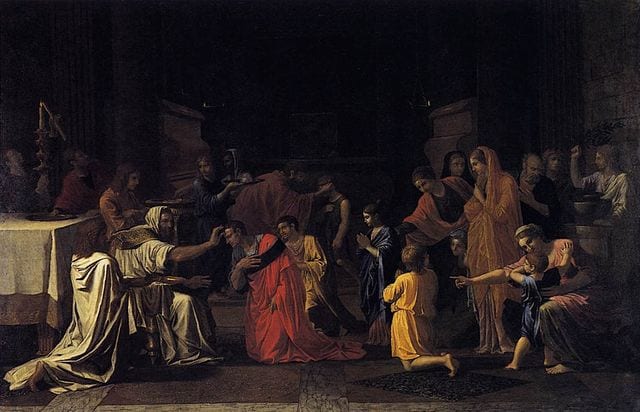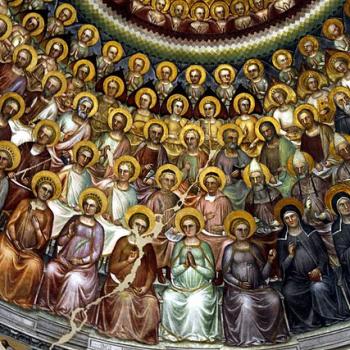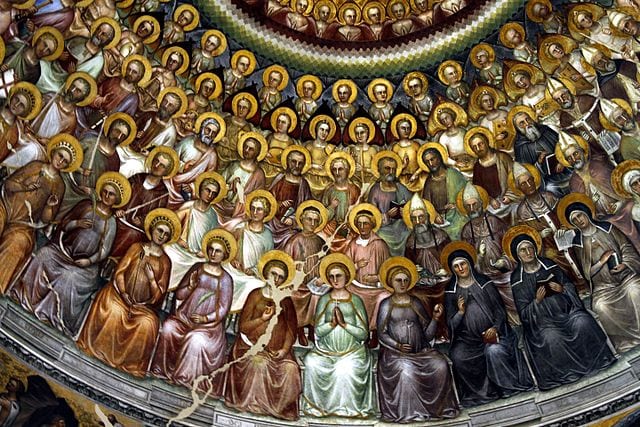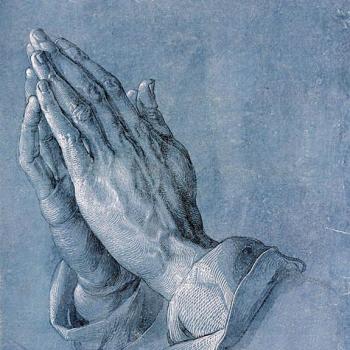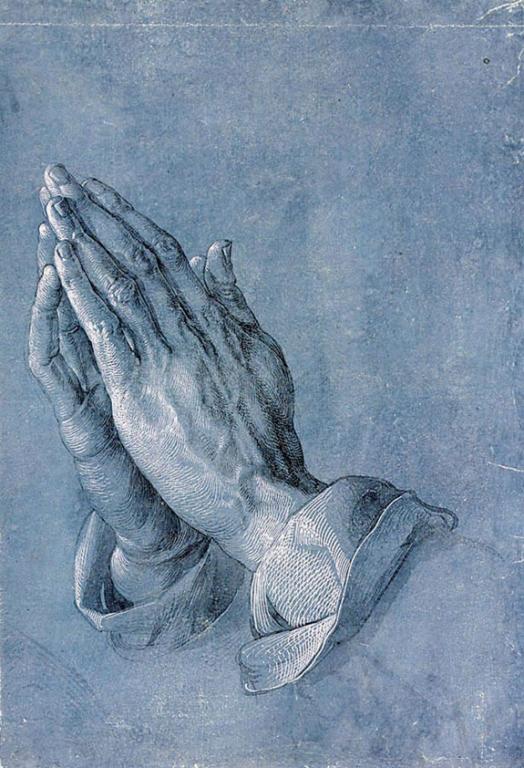This interesting and cordial discussion occurred in a combox on the Green Baggins website (starting from my first comment at #205). Rev. Lane Keister (“greenbaggins” in the thread: words in blue) — citing from his own profile — is a PCA (Presbyterian Church in America) pastor currently serving a CRC (Christian Reformed Church) and an RCA (Reformed Church in America) church. He graduated from Westminster Theological Seminary in Philadelphia with an M.Div. Andrew McCallum’s words will be in in green; Jeff Cagle’s in purple.
* * * * *
Bryan [Cross] has been for quite a while one of the few Roman Catholic commenters on this blog,. . .
*
I would be willing to add myself to that small list, if it could be clarified what the “official” stand of this blog is with regard to Catholicism. I have a policy of not interacting with anti-Catholics: i.e., those who classify Catholic theology outside of Christianity in a way that sets it apart from Protestantism, so that the Catholic who consistently follows his Church’s teachings in all respects is thought to be little better than a Jehovah’s Witness, Mormon, or any other heretic (and these “cults” deny the Trinity, which we, of course, do not do: since Protestants pretty much derived their own trinitarianism and Christology from us in the first place: Nicaea, Chalcedon, etc.).
*
Basically, the important question, for the sake of dialogue and ecumenism, insofar as possible without violation of anyone’s principles, is whether Catholicism as a whole is to be regarded as a Christian entity or not. It is entirely possible to take such a position within a Reformed framework, as, for example, Charles Hodge did, and as many Reformed Protestants today do (the ECT agreements, etc.).
*
Socrates held that good, constructive dialogue was only possible if folks understood the views of their opponents, had some measure of respect for them (including recognizing things in common), and preferably if those in a dialogue were actually friends or at least not hostile to each other.
*
My interest lies in Protestants who regard Catholicism as a Christian theological system, albeit with many serious flaws, as they see it. It’s fine if someone has an honest disagreement with Catholicism. It is the recourse to denying that orthodox Catholics are Christians and brothers in Christ that I think is ridiculous and indeed, intellectually suicidal, once we examine all of the questionable premises involved and the ludicrous notion of Church history that is necessarily entailed by such a view.
Dave, the definition of “Christian” here is very slippery and difficult.
Where would you derive your definition? I’m curious.
If all you mean is that we accept Catholic baptisms as valid, then yes I do.
So did John Calvin, so that is not unexpected.
If you mean that I have to view Catholic doctrine as basically non-heretical, then no I don’t.
That’s beside the point. It is not deeming certain aspects as heretical that is the problem (we do that with all strains of Protestantism, too), but a classification out of Christianity altogether.
I view Catholicism as apostate.
From what? Christianity? This is what I am trying to determine. Can one believe in Catholic soteriology and be saved in doing so, or must one deny it and become a Protestant to have any chance of being saved?
That doesn’t mean that I hate Catholic people (I have a dear Catholic friend who was my roommate in college), or that I would be rude to them.
I accept your word. I disagree with folks all the time as an apologist, and have no personal hostility towards them whatever. In fact, I went to a meeting with eleven atheists recently and spoke Christian truth to them, and we got along fine.
Anyone who believes that they get to heaven partly on the basis of their own works, even if grace is involved, is not a Christian in the stricter sense of the term.
Catholics deny Pelagianism and Semi-Pelagianism. We believe in an organic unity between faith and works, just as taught in the book of James, and as taught by Luther and Calvin, though they formally separated sanctification from justification as categories. It is incorrect to assert that Catholics believe in “works-salvation” or to deny that we believe in sola gratia. The Tridentine canons on Justification (particularly 1-3) make that clear.
So, it depends on how you define the word “Christian.”
My nutshell definition is: one who is a trinitarian, accepts the gospel (defined by the Bible itself) and the saving work of Jesus Christ on the cross on his behalf, and accepts the Nicene Creed. What’s yours?
Many people I deeply respect hold the views that you call “ridiculous” and “intellectually suicidal.” I wonder why you would use such rhetoric, if indeed you are interested in unity.
I was simply making my own views clear, so there is no misunderstanding. I understand that this might offend some, but of course it is also offensive for Catholics to be characterized as we are by many who hold anti-Catholic views. I need not go through the laundry list. In fact, “Romanism” itself is usually regarded as an outdated, pejorative term, and you use it yourself. It is understood in most circles that folks ought to be called what they call themselves. We call ourselves “Catholics.” We are happy to call you “Reformed” or “Calvinists” or “Protestants” or whatever you like. There must be a certain leeway in titles, for the sake of courtesy and respect.
As I said, though, firm Romanists are welcome to comment on my blog, and I try to keep the rhetoric to a minimum, and instead concentrate on substance. I don’t have any idea where this places me in your reckoning.
Your further replies will help me to better understand where you are coming from. Thanks.
P.S., Dave, all true Catholics should regard someone like me as apostate, as well.
That’s not true. We regard Protestants as fellow Christians and part of the Body of Christ. Vatican II makes this abundantly plain. In one of my papers I extensively cite the Decree on Ecumenism, where this is made crystal clear.
So it should go both ways, if Catholics are to take Trent seriously. After all, it pronounces an anathema on me for believing that a person is justified by faith alone without my works playing any part whatsoever.
No; it is not pronouncing an anathema on you personally (in fact, it never names Luther or Calvin or any Protestant group, as I recall). It is condemning a bare, antinomian faith alone of a sort that was renounced by Luther and Calvin (and the most thoughtful Reformed minds today), who do not disparage the necessary role of good works in a Christian’s life at all.
*
The “Trent anathema” issue is complex, and often highly misunderstood. Trent has to be understood in light of subsequent development in Catholic thought. Many things have improved in Protestant-Catholic relations over 450 years.
*
I wouldn’t regard any Catholic as having a personal vendetta against me just because their church’s official position is that I am condemned.
*
Again, personal vendettas have nothing to do with it. I have many, many close Protestant friends and we get along fine. But too often, in practice (all of us being sinners), folks’ theology make them hostile and uncharitable and they take the lowest possible view of the integrity of those who differ. You and I may not do that, but many do, and this is part of the reason that I no longer bother interacting with anti-Catholics. My experience has been what it has been. I can’t change that. Paul commands me to avoid the fruitless dispute and vain controversy and I take that very seriously.
*
So, it’s [a] mirror image both ways, in my opinion.
*
Again, I respectfully disagree. Official Catholic teaching holds that Protestants are fellow Christians and separated brethren, whereas official confessional Reformed teaching often classifies us as “antichrist” and Pelagian, idolatrous, semi-pagan, etc. The Lutheran confessions (in at least one place) literally equate the Mass with “Baal-worship.” Many Protestants do not follow those characterizations today, of course, but they are in the documents. But Vatican II has clarified what we think of Protestants. It is not a “mirror image” at all. But the majority of Protestants today are not anti-Catholics in the sense of denying that Catholicism is Christian.
*
Dave, we can agree on many things: the Apostles’ Creed and the Nicene Creed for starters. I will cheerfully admit also that you and I have much more in common than I would have with Mormons and JW’s. As a result, if you wish to dialogue with me, I am more than willing. For myself, you can expect respect, lack of rhetorical flourish (done in order to belittle opponents), and a desire to stick to the logical points. However, if you’re waiting for an admission that Catholics are Christians, that won’t come from me, because of the ambiguity of the word.
*
I cannot agree with your interpretation of Trent. Pope Leo X excommunicated Martin Luther for his doctrine of justification. If all Trent did was reject something that Luther also rejected, then Leo had no need of excommunicating Luther.
*
*
Luther had, for example, also rejected papal and conciliar infallibility and asserted Scripture alone by that point (thus logically ruling out apostolic succession as well). All these positions were radical innovations. The consensus of patristic and medieval scholars of all stripes (despite the polar opposite opinions of some in this thread [subtly referring to David T. King] who are not patristic scholars) is that the fathers and medievals did not believe in sola Scriptura as Luther and subsequent Protestants understood the notion.
*
It is rather easy to understand (and accept), I think, that any institution has the right to expel from its ranks those who no longer believe in its teachings. Protestants do the same for far less reason than we had with Luther. The analogy I always use is a scenario whereby I went into a staunch confessionally, traditionally Reformed seminary and denied all five tenets of TULIP, yet asked to be retained on staff as a teacher. That would never do. I’d be booted out (literally) virtually as soon as the words came out of my mouth.
*
At the Synod of Dort, the Arminians were in fact expelled from Reformed-dom in rather unsavory terms, for denying TULIP. Yet on the other hand it is thought to be the height of outrage that we excommunicated Luther for consciously having denied at least 50 of our beliefs (far beyond merely soteriology), as if that is not the most predictable, sensible thing in the world to do.
*
He was no longer a Catholic. Period. End of story. We did not bring that about. He did, by his own free choice. Things aren’t endlessly malleable, as if Catholic theology and tradition were a wax nose, to be molded at whim by anyone (including a pugnacious Augustinian monk known to be prone to rhetorical, emotional, and scrupulous extremes). We had an established theological tradition just as y’all did and do. And we have parameters for orthodoxy just as y’all do.
*
To say now that all it does is reject an antinomian version of justification does not do justice to the historical situation. If Vatican II wants to change relations with Lutheranism (and one can certainly argue that it does), then it should retract Trent, not redefine it.
*
Thanks for your reply. I am enjoying our exchanges, and I appreciate your gentlemanly demeanor.
*
First of all, how could one who accepts the Nicene and Apostles’ Creed not be a Christian? I think that is something you should ask yourself.If those do not help clarify who is and who is not a Christian, what in the world does? This is the very purpose of creeds and confessions: to determine in a concise manner who is within and outside of the fold.
*
I don’t see how you can argue on the one hand, that “Christianity” is an “ambiguous” and slippery term, and on the other hand, be reluctant to apply it to Catholics. If it is so difficult to define, wouldn’t it make more sense to extend it in charity to Catholics: a case you find difficult and complex, rather than refuse to outright call Catholics Christians (in the doctrinal, creedal, confessional sense)?
*
That makes little sense to me. I would say that it is fundamental in all rational discussions (and I think we can readily agree on this) to define terms: especially ones that are central. In this case, one must define “Christian.” It is surprising to me that you would stress the “ambiguity” of the very word “Christian.” Clearly, you regard yourself as one, so you must have a reason to do that (or so I strongly presume). Yet you wonder if Catholics are, and lean against proclaiming that they are.
*
I don’t think that is coherent. Without a clear, concise definition from the outset, I don’t see how you could even withhold a judgment with regard to Catholics. You should, I submit, remain strictly neutral at worst, until you nail down the meaning of “Christian.” The thing to do is define “Christianity” and then go from there and figure out who fits into the category.
*
For myself, it is quite clear, and always has been, as an evangelical cult researcher in the early 80s and now as a Catholic. Those who deny trinitarianism and the deity of Christ are not Christians. Period. Pelagians are not. Those who worship someone other than God are not. Catholics are, by all these criterion.
*
As to the the Tridentine anathemas and related issues, I dealt with this in a paper of mine:
The Catholic Understanding of the “Anathemas” of Trent and Excommunication. First of all, I corrected the common misunderstanding that “anathema” means “damned.” This is untrue. The Catholic Church does not make pronouncements on the eternal destiny of individuals, including Luther, Calvin et al (I believe this even includes Judas). In fact, in one of my fictional dialogues I portrayed Martin Luther quite favorably as now in heaven (and I am as orthodox a Catholic as they come). Calvinists are the ones who proclaim folks to be damned; not us (even though Calvin stated more than once that it is not known for sure who can be said to be of the elect or not).
*
Those who are interested in this topic and in Catholic-Protestant relations and ecumenism (and soteriology in general) might want to read my entire paper above. Along these lines, I myself have written several papers trying to illustrate the common soteriological ground between Catholics and Protestants: a thing vastly misunderstood, sadly, on both sides of the dispute.
*
It was stated above in this thread that Catholics have anathematized all Protestants or all who adhere to sola fide. That is simply not the case, as I have explained. It’s not just myself saying this. The discussion noted above was spearheaded by the present pope, and this is his own interpretation of what the Tridentine anathemas mean, and how they apply (or don’t apply). That is highly significant.
*
The pope certainly is a more authoritative interpreter of Trent (some of the doctrines he himself upholds as pope) than Protestants who come to it with a very negative inclination from the outset, just as y’all would expect some renowned Reformed theologian to understand his own theology better than I would.
*
I should think this is a positive thing. I love ecumenism because it brings Christians together, rather than separating them. There is so much misinformation and cynicism on both sides that such efforts are often doomed before they even begin. People refuse to accept that there is common ground. I dispute with Catholics who don’t accept their own Church’s teaching, and with Protestants who think the differences are greater than they actually are.
*
I have shown, I think, how
John Calvin misinterpreted and misunderstood Tridentine soteriology. It’s extremely common in Protestant circles. And Catholics just as often misunderstand Protestant teachings (especially in light of the fact that there are so many varieties of them). Having been in both camps, I try to be a bridge and clear these myths up as best I can.
*
Many, many Protestants make the same mistake that Calvin did, insofar as they claim that Trent denied Grace Alone and the gospel or asserted Pelagianism (or even semi-Pelagianism). A lot of it stems from an unbiblical “either/or” reasoning.
*
There are mountains of disinformation. I know: I’ve been dealing with it for almost 20 years now, as a former Protestant Catholic apologist.
*
But the bishops at Trent didn’t necessarily misunderstand Protestant faith alone totally. They were opposing antinomian distortions of it that were rampant by that time, just as Luther and Calvin themselves did. The mistake perhaps (a quite understandable one in that environment) was in painting with too broad of a brush.
*
What was condemned was not Lutheranism or Calvinism by name, but false views such as an antinomian bare assent masquerading as true biblical faith: something both Catholics and (most) Calvinists vehemently deny: as seen in the debates over Lordship salvation in our times.
*
You guys continue to fight amongst yourselves about what sola fide truly means, yet you expect us to have gotten it perfectly right in the emotionally-charged 16th century? The earliest Protestants anathematized, and (more than that) damned and killed each other from the get-go, and you expect us to understand all the finest points of the myriad Protestant theologies, right from the outset of Protestantism? Luther condemned antinomian distortions of his teachings (and I’m sure Calvin did the same), just as Catholics condemned the same sort of false doctrines.
*
So again, there is an encouraging, heartening common ground to be found here, if only folks are willing to do that and get past all the historic myths and lies on both sides about the “other” guys.
*
This is why I came here in the first place: to see if constructive discussion can be had. I think it can be with those here who aren’t already anti-Catholic.
*
I still await clarification from greenbaggins (going way back to #212 and #215) on what exactly he thinks “Christianity” is, and how he can conclude that Catholics are apostates before first figuring out the definition of the thing we supposedly left: on the logical principle that one cannot know if x is a species of y or not without first determining the precise nature of y.
*
In other words, if one claims that something is outside the parameters of something, one must first have a clear grasp of the thing that is the category in question; otherwise (given the proclaimed “ambiguity”) it makes sense only to hold an agnostic position, not an exclusionary one.
*
Way back about 50 posts or so you were asking about whether we believed Catholics were Christians and Lane responded that the term “Christian” is “slippery and difficult.” I would agree with that comment.
*
We’re back to my original counter-reply which has not yet received an answer. You and Lane both say the word “Christian[ity]” is ambiguous, yet I highly doubt that either of you despair about whether you are included in the category. So it isn’t ambiguous when you think of yourselves or your tradition.
*
Nor is it when Lane claimed that Catholics are apostate and that he hesitates to describe the system as “Christian.” This is plainly incoherent. The definition must be nailed down first. It’s not that difficult at all, really. But to say one isn’t sure what it is, yet at the same time, be “sure” that Catholics can’t be classified therein without hesitation, just won’t do. It is internally incoherent. And I think it illustrates that many Protestants have not properly thought the issue through, to have such uncertainty on a basic definitional issue. Nothing personal at all; I’m simply discussing ideas and theology.
*
I’ve thought about these issues myself for almost thirty years, because in the early 80s I specialized in cult research (particularly regarding JWs). We had to be very clear what was Christian and what was not.
*
but would also add that the term “Catholic” is slippery and difficult as well. All of us Reformed folks know lots Catholics who are faithful to their religion as best as they know how, but still come to very different conclusions on theological and practical matters. I remember watching a documentary where some film makers were interviewing folks coming out of a Catholic church. They asked them about their hope for salvation. One of the first interviewees said that she trusted in God’s grace and that Christ’s sacrifice alone was sufficient. But the others talked about trying to be good and keep the Ten Commandments and so on. So my take away here, while of course not knowing these folk’s hearts, is that the first interviewee was likely a Christian and the others probably were not. They may all have been faithful Catholics as best as they had learned to be, but it seemed to me that the light of the gospel had only been impressed upon one of them.
*
But this is completely irrelevant. The nature and content of Catholic theology is not determined by interviewing often relatively uneducated Catholics or an old Catholic lady in purple tennis shoes (anymore than it is determined by interviewing the usual 80% or so proportion of even evangelical and Calvinist churches, who never crack a Bible study), but by consulting Catholic dogmatic sources. It’s as easy as going to the Catechism.
*
Why would anyone think that determining a group’s beliefs was a matter of head count rather than official sources? I think this is fashionable because in fact there are very many Catholics ignorant of their own theology (why that is, is another long discussion). But there are also plenty of Protestants ignorant of their theology (i.e., one of many variant Protestant theologies) as well. It proves nothing. All it proves is the level of ignorance that obtains in the typical common member of a group and that the teachings of said group have not been properly passed down.
*
On the other hand, saying that works have something to do with salvation, insofar as they exhibit genuine faith (per James and many many Pauline passages that I would be happy to produce if someone doubts this), and in a non-Pelagian fashion, is quite biblical. The problem is that it becomes a very subtle discussion, to make all the proper distinctions and draw all the fine lines, in both Catholic and Protestant theology.
*
As we would expect, then, many relatively uneducated, unsophisticated Christians of all stripes (indeed, even many sophisticated, educated ones) get these distinctions wrong and incorrectly understand. And so the average uneducated Catholic will tend to think they are saved by works and discount faith, while the average evangelical or Calvinist Protestant will tend to go to the other extreme and adopt a radical faith alone that has no place for works (even though Luther and Calvin expressly eschewed such a notion).
*
The basic gospel is communicated literally in every Catholic Mass, as I have shown in
one of my papers. If someone doesn’t “hear” it, it is because of their own inattention and apathy, not because it isn’t there to be heard and received and appropriated in their own lives.
*
A Christian in Scripture was first called so by those in Antioch who observed that this sect followed the teachings of Christ. But what does it mean to follow Christ?
*
It has both a devotional / relational and doctrinal component. The Christian devotes his life to Christ and resolves to follow His teachings and way of life. But the Christian must also have correct theology on the “non-negotiables” (back to the Nicene Creed, etc.). One can’t simply say that they are following Christ without the doctrinal component. Any Mormon or Moonie or Christian Scientist says that, but they follow a different Christ.
*
Nor can or should one express a perfectly orthodox theology (in whatever framework) while being cold and unloving and ignoring the ethical / moral aspects of our Lord Jesus Christ’s teaching. We know that such a person would be rejected by God on the Last Day, because we have express biblical teaching that this is the case.
*
The somewhat different answers to this question underlie the point that Lane made about definitions of the term “Christian” being rather difficult.
*
I don’t think it is; I think the definition has these different components that I have outlined, and that many Protestants (and Catholics) are confused by that and confuse the two and don’t nail it down. They simply need to ponder it and think it through. I think if that were done, with informed participants on both sides of the debate, that much could be accomplished.
*
My impression is that most of the Catholics that frequent blogs such as this one are Thomists and thus do believe that salvation is by grace alone.
*
Both Thomists and Molinists (I am in the latter camp: as a “Congruist”) believe in Grace Alone, because the latter is dogmatically asserted in Trent, and both are equally bound to it. Questions of predestination are distinct, and we are allowed to have some disagreement on that in Catholic dogmatic theology.
*
But before Trent and even after Trent not all Catholics were Thomists. I would say there are relatively few in the Catholic world who even care about such distinctions and for those really serious Catholics, Thomism is not the only option open to them.
*
One can always find ignorance in any camp, just as one can always find sin. To me that is totally uninteresting and irrelevant to the questions at hand. It’s a piece of sociological analysis (my major in college) and not theological analysis. I’m all for sociology and understanding all those things better (I love surveys and demographics), but (with all due respect) it is beside the present point (“what is a Christian?”).
*
Personally I don’t like the term “Romanists” and “Papists” and I don’t use them. I do use the term “Roman Catholic Church” or RCC for short. I think this is apt and descriptive term, although I know my Catholic friends don’t particularly like it.
*
Cheers…
*
Thanks very much, Andrew, for your comments and their irenic tone. I enjoyed interacting with them, and I hope I didn’t state anything that would offend you (or anyone else). It was assuredly not my intention. I’m just talkin’ theology.
Just as Protestants (then and now) misunderstood Catholic teachings. This is the human condition: especially in times of great controversy and change.
The difference, however, is that Protestants do not claim infallibility for their doctrinal pronouncements. Calvin might have been wrong, and my faith will not have been in vain.
By contrast, Trent cannot have been wrong in your view. Thus, if it now appears that Trent was incorrect, your only possible move is to reinterpret Trent so that it doesn’t apply to Luther and Calvin.
I’m not a Reformation history scholar, nor a betting man, but I would bet a beer that the Roman Catholic church in the 17th century understood that the canons of the 6th Session were directed against mainstream Protestants and not merely antionomian extremists.
(my wife and I do bet Rita’s water ices with each other. Oddly enough, the net payout is always 0).
*
You miss the point. Trent (to my knowledge; I’m pretty sure about this) never named Calvin or Luther, or even Calvinism or Lutheranism. If it had done so, and had condemned them by name and misrepresented them in particulars (as the Catholic Church routinely is misrepresented in Protestant confessional documents) then you would have a point. That would have been a documentable and established factual error.
*
What it condemned (e.g., a truly bare assent of faith, and/or antinomianism) was indeed false, and mainstream magisterial Protestantism agrees that it is (since Luther and Calvin condemned the same extremes that occurred among those who claimed to be their legatees or who broke away from them. It was correct in what it condemned. That’s not an error; rather, it is a question of what exactly was intended to be covered by any given particular condemnation.
*
The error, therefore, lies in your logically flawed analysis, not in Trent. :-)
*
I haven’t studied the matter personally, but I have heard many times that, e.g., a great many of Luther’s 95 Theses were perfectly orthodox by existing Catholic standards.
*
Another way to look at it is as follows:
*
Suppose as a hypothetical,that I create an “infallible” document wherein I state, among many other things: “those who deny that 2+2=4 are hereby anathematized as dunces and arithmetically-challenged.”
*
That is the statement in the document, and it is undeniably true in terms of its mathematical accuracy.
*
Suppose also that I as the author mistakenly believe that this state of affairs (mathematical duncehood) is true of PCA, CRC, and OPC Reformed Protestants, and also of Wisconsin Synod Lutherans and the Podunk Storefront Fundamentalist Church at 245 Elm Street in Ashtabula and those in Joel Osteen’s mega-relevant,with-it, hyper-trendy church.
*
The latter is an error of fact. But (here’s the bottom line) it is not stated in the infallible document. Therefore, to implicate the infallible document as not infallible because of something not in the document itself is irrelevant; a non sequitur in the fullest sense of that word.
*
This is exactly what a few of you are attempting to do with Trent. I have explained the logic of it and how the Catholic Church (including the pope himself) interprets the matter. Like I said, it should be an encouraging thing to you, that the dreaded anathemas are not as sweeping as you had supposed. But instead, you want to hang on to the old tired divisions and timeworn rhetoric of nearly 500 years. You can’t accept the report even of a Catholic pope, about what an ecumenical Catholic council entails with regard to Protestantism.
*
People do understand things better as time goes on. This is an instance of that. It is not required to believe that every Catholic alive in the 16th century (including the bishops at Trent) had exhaustively accurate knowledge of every jot and tittle of every Protestant sect of the time. Nor is this necessary in order for the dogmatic statements of Trent to be true.
*
They could very well have been wrong about what applied to whom. But this has no bearing on the truth or falsity of doctrinal statements in the infallible Tridentine documents, as shown above, by analogy.
*
[see Jeff Cagle’s entire
comment #268 regarding Luther’s excommunication]
*
Nevertheless, Dave, it is true that Luther was excommunicated for his doctrine of justification: specifically as we see above, for teaching that man is simul iustus et peccator, and that man’s penalty for sin is remitted along with the guilt (so that indulgences are of no weight).
*
Lots to reply to, but I am immensely enjoying the exchanges and challenges. Thanks to the hosts for allowing me the privilege and pleasure of interacting with the many thoughtful folks here. I appreciate the opportunity very much.
*
Hi Jeff,
*
You haven’t overthrown my original contention at all. I claimed that many more issues were in play with Luther and his excommunication besides justification. You even helped bolster my point by providing a few examples. How this disproves what I stated is, I confess, a great mystery to me.
*
There is a misunderstanding here. I agree with the factual content of your statement and was not attempting to disprove it, but to qualify it.
The fact remains that Luther was excommunicated for, among other things, his doctrine of justification, which is what Lane originally stated.
If we can agree on this point, then it seems reasonable to close the book on the matter.
*
No offense taken, I take it that you are just giving us your straightforward impressions of what I say.
*
Indeed. I’m glad you understand that. I argue very passionately and sometimes (so I am told!) quite pointedly and in a “hit between the eyes” fashion; it is never intended to be a personal attack. I always try to stick to the ideas, doctrines, and logic involved. My argumentative passion (honed over 30 years of apologetics and debates) is often misinterpreted as emotional excess. It is not at all. I’m a very easy-going sort and am said to be “soft-spoken.”
*
In person that would be immediately obvious, I think (again, so I have been told many times). I just want to nip this “issue” in the bud before it possibly becomes a problem here, because I am enjoying myself and hope I can hang around a bit, if you guys are willing to put up with my challenges and perhaps sometimes “provocation,” as it were. I come on like gangbusters, sometimes. It is simply my aggressive debating style. I love true debate and dialogue. Sometimes others do not share my love and find my particular consciously socratic style offensive or off-putting.
*
In #205, you asked about the official stance of of this site on Catholicism. I’m not the owner nor a moderator, so I cannot comment here. I was just chipping in on a comment or two that Lane made. You said that you did not want to interact with those who you deemed to be “anti-Catholic” and I understand this and certainly don’t blame you.
*
It’s wonderful that this is understood. No one likes to try to interact with folks who are persistently hostile, and often, unfortunately, in a directly personal, ad hominem fashion. I’ve been personally called every name in the book over 14 years online: virtually every calumny imaginable. I won’t bore you or anyone with those details. Like I said, my experience is what it is, and I can’t change it.
*
I think that you will find most all of the Protestants who interact here are fair-minded and careful in the way they interact.
*
I have indeed found that to be the case and overall I like this place and the people here. I think there is an excellent, refreshing mix of thoughtfulness and cordiality. I’m delighted that I haven’t been 1) personally attacked, or 2) kicked out yet. :-) Surely we all are aware of how rampant such things are on the Internet. I gave up on discussion boards way back in 2003 because of it.
*
Frankly, I still marvel, however, that there is no clear definition of “Christianity.”
*
Dave, it’s not that we cannot define Christian. That is easy enough. But you are were asking about the individual Catholic in #205 (when you said that Protestants would often liken the faithful Catholic to a Mormon, etc). A Christian is one who knows Christ because Christ knows him. When you ask about the faithful Catholic and whether we would consider him a Christian our response is we that cannot say this because we cannot know the heart of the individual nor can we know the mind of Christ.
*
* * *
*
I find that to be a remarkable, astounding thing. My questions in that area have ultimately been left hanging (I assume that there are competing time demands in some cases). You have grappled directly with them at some length (thanks) but as of yet you don’t seem to have offered a clear answer, either. Do you acknowledge that you should reasonably have a clear answer?
*
So my response to you in #262 could be summarized in a sentence to say that we are not going to assume that someone is a Christian just because they are a member in good standing in the RCC, but we are not going to deny that there are many Catholics who are truly Christian.
*
Good, but what is a Christian in the first place? My position is that there is a lot of ignorance. We can’t determine what Catholicism teaches by taking head counts of usually under-educated, too often misinformed or compromised collections of Catholics on the street. We can’t do that with Protestants, either. We have to look at “the books” in both cases. I don’t see how that is even arguable.
*
Again, I say that any “ambiguity” comes from the second aspect of the definition: that of one’s personal position in relationship with God. You guys say one is either justified or not. We follow that to a large extent but we also look at it more as a process. The Catholic examines himself right now to see if he is in a state of mortal, grave sin, or separation from God. If I’m in bed with a prostitute as I type this, then I am not in a good place with God. We say that this is a mortal sin and that death minus true repentance could quite possibly land one in hell for eternity.
*
You guys say that it proves that a person never was justified or regenerated in the first place; lest he wouldn’t be indulging in such serious sin. It is a formal difference but a practical agreement. In both instances the person is clearly in a bad spiritual place, is seen to be a rank hypocrite, and is in distinct danger of damnation.
*
So you look at the “good” Catholics and the “bad” ones and determine who may or not be a Christian in that behavioral sense. You still incorporate behavioral aspects. This is what I find informative. You don’t separate — in the end — the aspect of good works and behavior and avoidance of sin anymore than we do. You simply categorize things differently.
*
But we don’t say that someone who is an obvious state of rebellion ever was Christ’s sheep. Christ says that He knows His sheep and they will never perish. They cannot be His sheep at one point and then slip through His fingers later.
*
* * *
*
But — that said — I would contend that in the final analysis, a person’s state of soul is known only to God. As fallible, limited, finite human beings, we can only determine who is a Christian (as a practical matter of categorization) by a doctrinal analysis. That’s why I always ask Protestants if they think Catholicism is Christian as a system of theology. And I say, “can a Catholic who believes all that his Church teaches be saved?,” or, “does one have to be a bad Catholic in order to be a good Christian?”
*
It’s the doctrinal, creedal emphasis. Protestants normally extend this charity of category to all other Protestants (with some exceptions), but for some odd reason there is reluctance to do this in relation to Catholics (and often Orthodox as well).
*
Now I’m sure there are some Reformed folks who may interact here that disagree with the last statement, but I think it is generally true of most of the Reformed folks who come here.
*
I’ll take your word. The tone of this site is plainly very different from most Reformed sites I have seen (that tended to be anti-Catholic and often extremely uncharitable, sad to say).
*
You need to understand that we are not generally going to try to differentiate between Catholics who do hold to official RCC theology and those who don’t.
*
Why not? I submit that you wouldn’t like it much if I made no differentiation between the most wacko Protestants out there (some not even trinitarian, some antinomian, some compromised on various moral issues or liberal in theology, some off on wild hyper-faith delusions, etc.) and a solid, traditional, confessional, morally conservative Presbyterian or other Reformed Christian. If we are expected to be aware of all the fine distinctions and to categorize properly, why are we not owed the same thing in return? The only objective way to do this (on both sides) is to consult official theologies.
*
Someone is “Catholic” if they are a member in good standing of the Catholic Church. But worldwide this allows for a massive breadth of belief systems.
*
I dispute that. It is easily said, but it is never proven. Many Catholics, for example, dissent on contraception. But that no more disproves the official stance of the Catholic Church than cohabiting evangelicals disprove the traditional Protestant stance against fornication. You guys look and see dissenters, but note that this is exactly what they are: “dissenter” implies that there is something solid that is disbelieved: not that there is no ascertainable belief merely because there is a dissenter. Our beliefs are plain and clear. If you have doubts, I’d be happy to clarify any given one for you.
*
We’re not Episcopalians (or any number of other Protestant denominations who decided to overturn moral teachings with a majority vote at a gathering). Our teachings don’t change. We don’t decide that all of a sudden homosexuality or masturbation or abortion or contraception suddenly becomes moral after centuries of being understood as immoral.
*
But Protestants actually change those things. Everyone here is certainly aware of the problem of liberal dissent. Catholics have plenty of liberals attempting to undermine our dogmatic teachings, too. But in our case, they have not changed any dogmatic teaching. In many Protestant scenarios, teachings have been changed. This is the essential difference. Please don’t project your internal problems onto us.
*
So when you ask us what we think of a given Catholic
*
I don’t believe I asked that (if I happened to in one place, it has not been my emphasis at all). You’re the one bringing up individuals. I asked what you thought of the system as a whole, that can easily be understood in all its dogmatic particulars by simply consulting official sources, just as we are referred to the Westminster Confession or what not in order to learn what an orthodox Reformed Protestant believes.
*
We’re not sent to the local Reformed drunk down at the bar at the corner to learn that. Nor should you consult a high school dropout Catholic construction worker or 90 year old lady playing Bingo to determine the nature of Catholic theology. Your responsibility is to consult the best Catholic sources you can find, just as I have the same responsibility in charity and intellectual honesty, towards any given Protestant tradition.
*
we are not going to answer you without some further qualification. And even for the conservative Catholics who can spout Ott and Denzinger and so on, the fact that they possess a certain body of knowledge does not make them a Christian. Again, we would need more information.
*
So your position is that espousal of a creed or confession thought to be orthodox has no bearing on whether one can properly be called a Christian? You don’t know the state of a person’s soul (what might be called the spiritual or “metaphysical” dimension of being a Christian). John Calvin taught that no one knows who is elect, with certainty. You claim no one can ever fall away from salvation, but you can’t know who is or isn’t a Christian on a behavioral basis, because you don’t know the future.
*
If someone is caught stealing or whoring or lying in your circles, you immediately conclude they were never among you. But you didn’t know that the day before. In many cases, such people were thought to be upstanding members of the local church. Therefore, because we don’t have certainty in these respects, a doctrinal criterion of what a Christian is, is in the end, the only reasonable and possible way to categorize and classify. And this is why you have creeds and confessions and mandatory dogmas, just as we do.
*
One other thing to note that I have often reminded the conservative Catholics who post here and other such loops is that outside of these Internet forums we rarely meet conservatives like them.
*
That’s right. And I rarely meet conservative Protestants, either. So what? We committed, educated Christians of all stripes are a rare breed. Always have been, always will be. Why should this surprise anyone?
*
I agree here, Dave. I think you and I have both gravitated to relatively small segments within Catholicism and Protestantism. But one of the issues that we have with Catholicism is that the liberal, heretics, and syncretists are still called “Catholics.” In the Reformed communions we don’t call those who deny Christ by any sort of Christian name. We remove those who deny Christ (or they remove us).
*
* * *
*
Jesus talked about the narrow way, and “few are chosen,” etc. All the more reason to evangelize and share what we have found: the pearl of great price. I have devoted my life to it.
*
Catholicism is what it is, not what the conservatives would like it to be.
*
It is what it is; right! And I am saying it is simple to find that out. Go read the Catechism. Go read Trent and Vatican II. Read Ott and Denzinger.
*
I have read quite a bit of the CCC and Trent and a little of Ott. But the heretics and the liberals read the same Church tradition as Ott, etc but come to different conclusions. The conservatives believe that Ott, etc’s understanding of the tradition of the Church is the correct one, but so do all the other groups within (and outside of ) Rome. So why should I conclude that the conservatives such as yourself have gotten it right?
*
By the same method that I can conclude that the conservatives such as yourself have gotten it right within the Reformed tradition. Things are what they are. It’s not difficult to identify the mainstream of any given Christian tradition, and it is usually easy as pie to spot the so-called “progressives” and dissidents and liberals. They always make it easy because they are so extreme. The Catholic liberal denies Catholic dogmas. It’s really no more complicated than that.
*
Dave – That’s fine, we see this. But the Catholic liberal is Catholic just like the Catholic conservative.
*
Unfortunately, on a local level, too many liberals are going around speaking for the Church and wreaking havoc. But there comes a point when discipline is imposed. Hans Kung, e.g., is no longer to be regarded as a Catholic theologian.
*
As for dissenters; someone thinks PCA [Presbyterian Church in America] is free from all such problems? That ain’t what I saw in the thread,
“Problems in the PCA?” (from Reformed forum) — filled with anecdotes of all sorts of internal difficulties. Or how about:
“The Gospel Crisis in the OPC and PCA,” by Brian Schwertley?
*
I was in the Protestant world, too, you know. I know what goes on. Liberalism is a problem almost everywhere, and where it isn’t, there are other problems of being too insular and exclusionary, anti-intellectual, and so forth, due to being too isolated and sectarian.
*
You asked us originally what we think of Catholicism and faithful Catholics, and I am responding with a question for further qualification as far as what part of Catholicism you are speaking of.
*
Historic orthodox Catholicism, of course.
*
If one wants to know what it is, one reads the Catechism, councils, papal encyclicals; aided (if necessary) by summaries and outlines like Denzinger, Ott, popular works of apologetics, Q&A Internet forums, etc.
*
I’d be happy to tell you what we believe on any given thing. It’s not rocket science. It’s no different than my asking you what Presbyterians believe about such-and-such. You cite your sources and you tell me the answer (unless the question involves an extraordinarily difficult matter like the definition of “Christianity” :-). But you have far more internal division than we do, as proven by the endless disputes y’all are in now, as always (Federal Vision, Reconstructionism, Auburn Avenue, N. T. Wright and works of the law, Lordship salvation, etc.).
*
Our beliefs are clear. Dissidents dissent from them, by definition. You guys have dissidents and liberals; so do we. It’s a fact of life. They don’t define what the belief-system is. The fact that there were Arians in the 4th century did not “prove” that, therefore, orthodox trinitarian Christianity was not able to be known and identified. People forsake historic Christian beliefs because they lack faith and the grace of God and/or are sinning (esp. in all the sexual areas).
*
And then as Lane said, if you ask us to speak of who is and who is not a Christian we want to know what YOU think is a Christian before we answer. The problem is not our coming up with a definition, but rather understanding what YOUR definition is.
*
I already gave my definition several times above, long before any of you gave yours. For example, in
#210:
My nutshell definition is: one who is a trinitarian, accepts the gospel (defined by the Bible itself) and the saving work of Jesus Christ on the cross on his behalf, and accepts the Nicene Creed.
* * *
*
The Protestant liberal (as in Machen’s analyses) denies Protestant dogmas. Are you saying you can’t figure out what the Catholic dogmas are? Jeff above certainly knew that the perpetual virginity of Mary was one such dogma, didn’t he?
*
* * *
*
There are lots of liberals and gross sinners in our ranks (just as in yours) but that doesn’t change a whit what a thing is. It only shows that folks are hypocrites and sinners and inconsistent, and I should think that any thinking, self-reflective Christian already knows this from experience (and looking in the mirror).
*
And the conservatives such as yourself are a relatively rare breed from what we can see.
*
Just as conservatives like you are in your ranks. You are in your cozy little sub-stratum and social club, just as I am (we must pick our mates very selectively these days). It’s no different. Outside of our small enclaves of traditionalism or orthodoxy there are many heterodox people.
*
Do you understand what I’m getting at?
*
I do fully, and I disagree in large part on the grounds that I am explaining. One can only sensibly define “Christianity” doctrinally. You do it in your confessions; we do it in our councils and dogmatic proclamations. So I continue to press you guys to tell me why Catholic theology isn’t Christian in a way that you would not say of any traditional Protestant denomination? Why are we “apostate”? What is the gospel? These are fundamental questions but they are not being answered. Eventually I’ll give up asking, but I think it is only for your good if you work out answers to crucial presuppositional questions.
*
We generally are not going to analyze the “official” theology of Rome to see who is in accord with it and who is not.
*
Alright; then I’ll ignore all your confessions, too, and act as if any Protestant Tom, Dick, or Harry on the street represents your beliefs as a Reformed Protestant.
*
Do you really mean this? If it is on record that a given preacher in the PCA is a minister in good standing in the PCA will you take this on faith or will you analyze his confession and practice to determine if he really is in accord with the WCF and other standards?
*
I was flipping your own treatment of Catholicism back on you, doing a reductio ad absurdum. You see it is unacceptable; therefore, you shouldn’t be so skeptical of what is Catholic orthodoxy, as if it is difficult to figure out. You illustrated my point perfectly in your reply. Thanks! :-)
*
* * *
*
Arminians are the same as Calvinists. Hyper-faith Pentecostals are in your camp and no different from you. Jimmy Swaggart and Jim Bakker are “your guys.” I won’t make any crucial distinctions among Protestant groups even though we Catholics are constantly excoriated for supposedly being so stupid and clueless about such things. See how it works? I’m only applying your own reasoning back to you, as a reductio ad absurdum.
*
We are going to assume that someone is Catholic if they are a member in good standing of the RCC.
*
And in return I will assume everyone is a good Protestant who says they are a Christian or a Protestant, no matter how ridiculous their beliefs may be: KJV-only, denial of the Trinity (UPC, Christadelphian, Unitarians), denial of the necessity of baptism (Salvation Army, Quakers), etc. I’ll assume they’re all the same in the big, happy family of Protestantism!
*
Can you not see how impossible (and unfair) such a chain of reasoning is? I owe it to you as a Reformed Christian to get your beliefs right, just as you owe it to me as a Catholic to have at least a rudimentary understanding of what orthodox Catholicism is. And we both ought to know that we know what a Christian is.
Good, but what is a Christian in the first place?
Acts 11: So for a whole year Barnabas and Saul met with the church and taught great numbers of people. The disciples were called Christians first at Antioch.
We actually have a stipulated definition for the word “Christian”: disciples of Christ. In the terms of the Confession, then, a “Christian” is anyone who belongs to the invisible Church.
In terms of our identification of Christians, it would seem reasonable to call a Christian anyone who belongs to the visible Church.
And that church is more or less visible in different congregations; and some congregations have degenerated so as to be no longer churches.
So the question of whether or not Catholics are “Christians” is really two-fold:
(1) Are Catholics members of the invisible church? (I would answer: In many cases, yes.)
(2) Is the Catholic church still a part of the visible Church, so that Catholics are identifiable as Christians? (I would answer: It appears to be just on the boundary).
*
I heartily thank Jeff Cagle for the most concise, sensible answer to my queries about who is a Christian. See, it wasn’t that hard to do (which is what I’ve maintained all along).
*
* * *
*
Thanks [Jeff] for your further comments. I suspected you would take the umpire analogy in the direction you did [see
comment #314]. The Catholic Church arbitrarily creates dogma, just like the umpire “created” a fake hit and ruined the perfect game . . . It’s simply not true.
*
***
(originally posted on 6-5-10)
Photo credit: jeffjacobs1990 (1-24-19) [Pixabay / Pixabay License]
***
